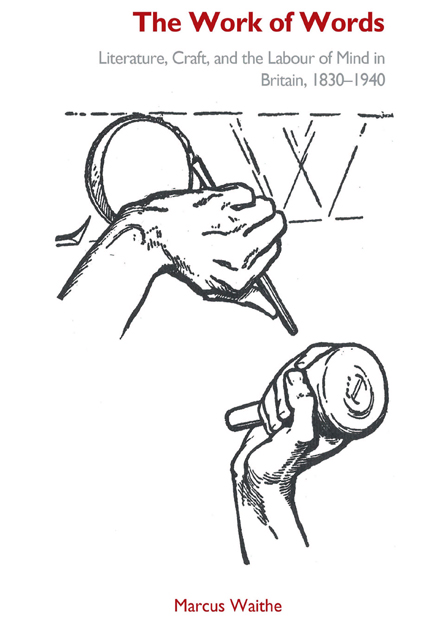Conclusion: Writing as Working
Published online by Cambridge University Press: 13 April 2023
Summary
The examples collected in this book address a literary rapprochement with the idea (and the practice) of skilled manual labour. Initially inspired by classical principles of united sensibility, its early Victorian form arises in Dissenting cultures of visible effort, neo-Lockean conceptions of property, prescriptions against occupational disease, and gymnastic ideas of self-culture; thereafter, it develops into a project of cerebralphysical integration, which assumes various shapes, before culminating in the Arts and Crafts (and latterly, modernist) vision of a craftsmanship that unites physical making with the mental conception. What comes into view is a sustained attempt to resolve and renovate the status of writing, a determination to make writer and writing accountable, to forge a physically legible ‘labour of mind’. The writers in question effect this outcome in different ways: through testamentary or material visualisations of literary work, writerly performances of agricultural labour or handicraft, as well as through craft-based theories of composition, literary association, linguistic tooling, and direct carving in prose.
Tracking these experiments across a hundred years illuminates a striking longevity of ideas and practices, as well as connections between apparently disparate contexts. Links emerge between Carlyle’s Teufelsdröckh on ‘Man’ as ‘a tool-using Animal’ (1:32) and Gill’s notion that ‘the tool is from the beginning that of the artist, no less than the labourer’. Others are apparent between Whistler’s rejection of hours counted at the canvas and Pound’s incongruous allusion to apprenticeship in his wartime broadcasts; between vaticism and artisanal approaches; and between the differing conceptions of an artist’s relation to a working God held by Barrett Browning, Hopkins and Gill. Meanwhile, Gladstone, Ruskin, Schreiner and Pound share an agrarianism focused both on labour value and an idea of poetic participation. As previously stated, the cases discussed are determined less by political loyalties, or a particular literary tradition, than by an evolving occupational strategy, one that responds to an inherited problem of value. In this respect, it is better to think in terms of loose formations than of a lineage or succession, though the textual and personal connections can be compelling, as suggested by Pound’s recourse to Whistler, Ruskin and Morris.
- Type
- Chapter
- Information
- The Work of WordsLiterature, Craft, and the Labour of Mind in Britain, 1830-1940, pp. 227 - 234Publisher: Edinburgh University PressPrint publication year: 2023



